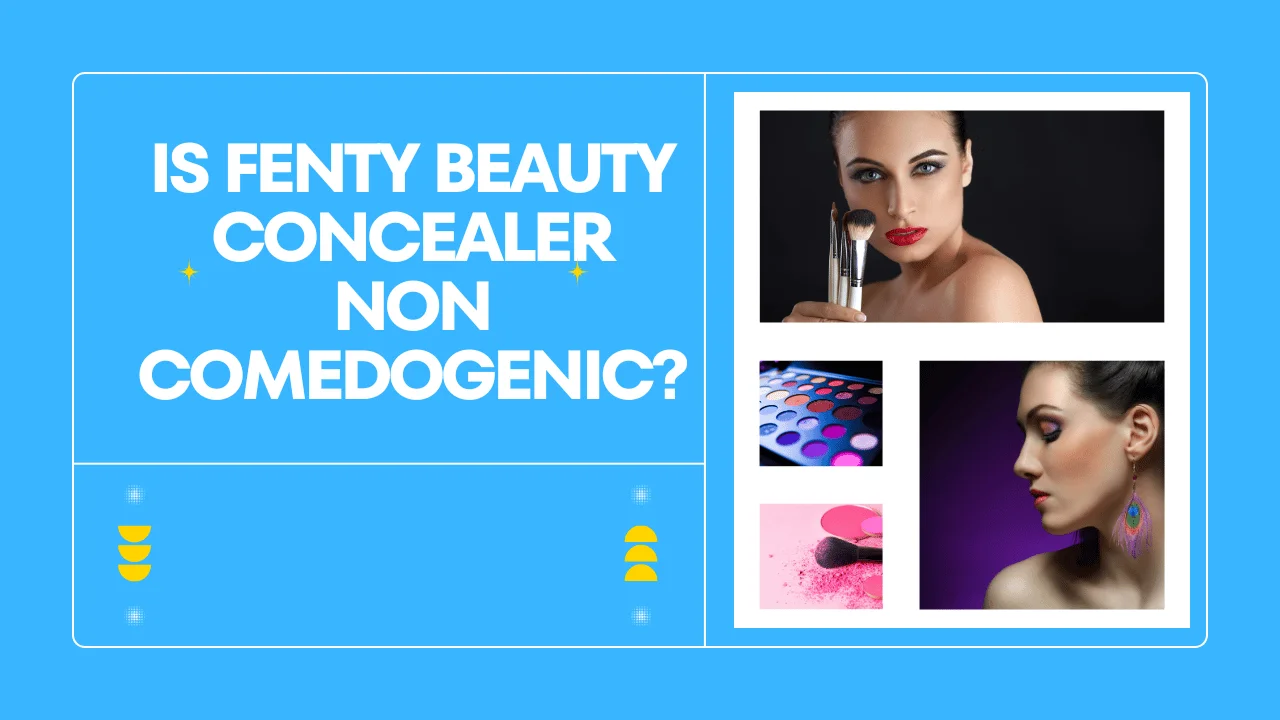We’ve all seen the stunning makeup transformations using Fenty Beauty concealers.
That flawless, airbrushed finish that seems to magically erase imperfections? It’s enough to make anyone want to grab a tube, right? But wait! If you have acne-prone skin, a crucial question hangs in the air: Is Fenty Beauty concealer non-comedogenic?
For those unfamiliar with the term, “non-comedogenic” simply means the product won’t clog your pores. This is a critical factor for people who struggle with breakouts, as clogged pores are a breeding ground for pimples.
So, before you dive into that gorgeous shade range, let’s delve into the science of non-comedogenic products and analyze Fenty Beauty’s ingredients to see if they’re truly a match made in makeup heaven for your skin.
We’ll unveil the key ingredients to avoid when it comes to clogged pores and breakouts. We’ll also explore how the formulation itself can affect whether a product is non-comedogenic.
By the end of this blog post, you’ll be armed with the knowledge to determine if Fenty Beauty concealers are a friend or foe for your unique skin. So, grab your favorite cleanser (because good skincare is key!), and let’s dive into the world of Fenty Beauty concealers and the all-important question of non-comedogenicity.
Contents
- 1 Understanding Non-Comedogenic Products
- 2 Analyzing Fenty Beauty Concealer Ingredients
- 3 Customer Reviews and Experiences
- 4 Expert Opinions and Dermatological Advice
- 5 The Future of Fenty Beauty and Clean Beauty
- 6 Conclusion
- 7 FAQ’s
- 7.0.1 Are Fenty Beauty concealers non-comedogenic?
- 7.0.2 Which Fenty Beauty concealer is best for dry skin?
- 7.0.3 Which Fenty Beauty concealer is best for oily skin?
- 7.0.4 Do Fenty Beauty concealers contain silicone?
- 7.0.5 Are Fenty Beauty concealers cruelty-free?
- 7.0.6 Where can I buy Fenty Beauty concealers?
Understanding Non-Comedogenic Products
A non-comedogenic product is formulated to minimize the risk of clogging pores and causing breakouts. This is crucial for individuals with acne-prone skin or those who are prone to blackheads and whiteheads. When a product clogs pores, it can lead to inflammation and the formation of blemishes.
Key ingredients to avoid in products, especially for acne-prone skin, include:
- Comedogenic oils: These oils, such as coconut oil and cocoa butter, can clog pores and lead to breakouts.
- Lanolin: This ingredient, derived from wool, can also clog pores and cause irritation.
- Isopropyl Myristate: This is a common ingredient in many cosmetic products, but it can be comedogenic for some people.
The formulation of a product, including its texture and oil content, can significantly impact its comedogenicity. For example, heavy, greasy formulas are more likely to clog pores than lightweight, oil-free formulas.
Analyzing Fenty Beauty Concealer Ingredients
To determine whether Fenty Beauty concealers are non-comedogenic, we need to analyze their ingredient lists. While specific formulations may vary, common ingredients in Fenty Beauty concealers include:
- Silicones: These can provide a smooth, silky finish and help to fill in lines. However, silicones can sometimes clog pores, especially for those with sensitive or acne-prone skin.
- Emollients: These ingredients help to moisturize the skin and prevent dryness. However, some emollients can be comedogenic.
- Pigments: These provide color and coverage. They are typically mineral-based and less likely to cause breakouts.
It’s important to note that while Fenty Beauty has made strides in creating inclusive and high-quality products, individual skin reactions can vary.
If you have sensitive or acne-prone skin, it’s recommended to do a patch test before using a new product. Additionally, consider consulting with a dermatologist to determine the best skincare routine for your specific needs.
Customer Reviews and Experiences
While Fenty Beauty concealers have garnered positive reviews for their coverage, blendability, and shade range, it’s essential to consider individual experiences. Many users with acne-prone skin have reported positive results, claiming that the products did not exacerbate their breakouts.
However, some users have experienced breakouts or clogged pores after using Fenty Beauty concealers. This can be attributed to several factors, including individual skin sensitivity, the specific formula used, and other external factors like pollution and stress.
It’s crucial to remember that individual skin types can react differently to various products. What works for one person may not work for another. If you have sensitive or acne-prone skin, it’s advisable to conduct a patch test before applying the product to your face.
Expert Opinions and Dermatological Advice
While Fenty Beauty concealers have gained popularity, it’s essential to consult with a dermatologist for personalized advice, especially if you have severe acne or sensitive skin. A dermatologist can assess your specific skin concerns and recommend suitable products.
Patch testing is a crucial step in introducing any new product to your skincare routine. Apply a small amount of the product to a discreet area of your skin, such as the inside of your wrist, and monitor for any adverse reactions like redness, itching, or breakouts.
Here are some additional skincare tips for acne-prone skin:
- Gentle Cleansing: Use a gentle, fragrance-free cleanser to avoid irritating your skin.
- Moisturize: Keep your skin hydrated with a lightweight, non-comedogenic moisturizer.
- Avoid Over-Exfoliation: Excessive exfoliation can irritate the skin and worsen acne.
- Sunscreen: Protect your skin from harmful UV rays with a broad-spectrum sunscreen.
- Healthy Lifestyle: A balanced diet, adequate sleep, and stress management can also contribute to healthy skin.

The Future of Fenty Beauty and Clean Beauty
In recent years, there has been a growing trend towards clean beauty. Consumers are becoming more conscious of the ingredients in their beauty products and seeking out brands that prioritize natural and sustainable formulations.
Fenty Beauty has responded to this trend by incorporating clean ingredients into their products and minimizing the use of harsh chemicals.
As a brand committed to inclusivity, Fenty Beauty continues to push boundaries and innovate.
We can expect to see further developments in their product line, including new shades, formulas, and finishes. The brand may also explore more sustainable packaging options and eco-friendly ingredients to align with the growing demand for clean and ethical beauty.
Fenty Beauty’s future looks promising, with a focus on innovation, inclusivity, and sustainability. By staying ahead of the curve and responding to consumer demands, the brand is poised to continue its success and shape the future of the beauty industry.
Conclusion
In conclusion, Fenty Beauty concealers have gained significant popularity for their inclusive shade range and innovative formulas. However, their suitability for acne-prone skin can vary depending on individual skin types and the specific product formulation.
While Fenty Beauty has made efforts to create products that are gentle on the skin, it’s essential to consider the potential impact of ingredients like silicones and other comedogenic substances. Patch testing is crucial to determine how your skin reacts to a particular product.
Ultimately, the best way to determine if Fenty Beauty concealers are right for you is to listen to your skin.
If you have sensitive or acne-prone skin, it may be wise to explore other options or consult with a dermatologist for personalized advice. Remember, clear and healthy skin is a journey, and finding the right products is key.
FAQ’s
Are Fenty Beauty concealers non-comedogenic?
While Fenty Beauty has not explicitly labeled their concealers as non-comedogenic, many users with acne-prone skin have reported positive experiences. However, individual skin reactions can vary. It’s essential to consider your skin type and do a patch test before using any new product.
Which Fenty Beauty concealer is best for dry skin?
The Fenty Beauty Pro Filt’r Hydrating Longwear Concealer is a popular choice for dry skin. Its hydrating formula helps to prevent dryness and cracking, providing a smooth and dewy finish.
Which Fenty Beauty concealer is best for oily skin?
The Fenty Beauty Match Stix Matte Skinstick can be a good option for oily skin. Its matte finish helps to control shine and can help to prevent breakouts.
Do Fenty Beauty concealers contain silicone?
Some Fenty Beauty concealers may contain silicone-based ingredients, which can help to smooth the skin and create a long-lasting finish. However, silicone can also clog pores, so it’s important to choose a product that suits your skin type.
Are Fenty Beauty concealers cruelty-free?
Yes, Fenty Beauty is a cruelty-free brand. They do not test their products on animals.
Where can I buy Fenty Beauty concealers?
Fenty Beauty products are available at various retailers, including Sephora, Harvey Nichols, and online through the Fenty Beauty website. You can also check for authorized sellers in your region.








